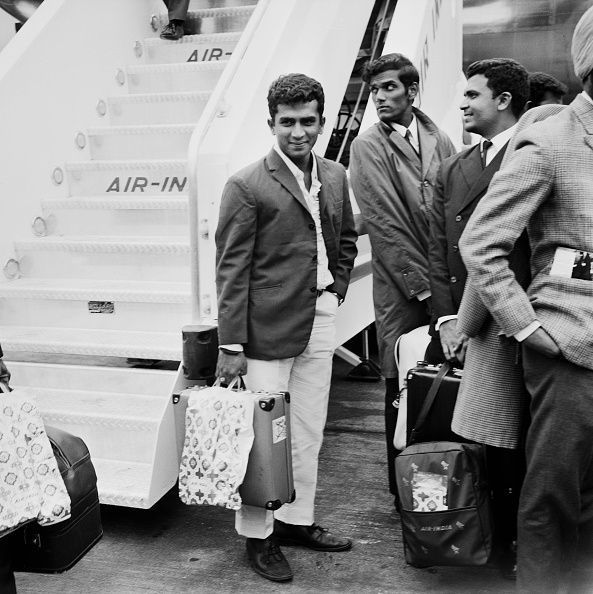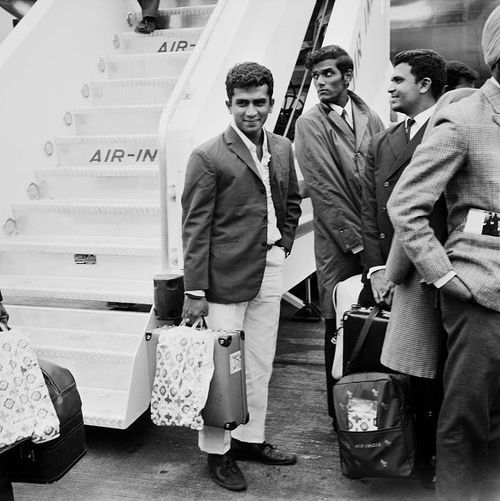
A century on a not so Sunny day

“Many people must be wondering as to what is the feeling when one gets a century in tests. My own reaction was simply to think of my parents who had given me every encouragement and they would be beaming when the news reached them.”
Above are the words of a certain Sunil Manohar Gavaskar in his autobiography Sunny Days recalling his first Test century. This was of course only his second Test match in 1971 against the West Indies at Georgetown. Well, firsts in life always have a special place in one’s heart and the great man’s above statement reinforces this belief of mine.
In the previous Test match, the team led by Ajit Wadekar had just achieved what no Indian team had been able to do till now. They had written history at Port of Spain by registering a victory over the mighty the West Indies in Test matches. And the little master had contributed to the victory, scoring half-centuries in both the innings. So, Gavaskar and the Indian team, in general, had come into the third test match beaming with confidence.
“We must stick around and score”
Gary Sobers won the toss for the third time in the series and decided to bat. The home team made 363 runs courtesy half-centuries by Clive Llyod and debutant wicketkeeper Desmond Lewis. In response, the Indians ended day two at the score of 114 runs for the loss of one wicket. Gavaskar was nearing his third half-century in as many innings when the second day’s play ended.
On the third day, the piece of advice that his overnight batting partner Wadekar had for the young Gavaskar was, “We must stick around and score”. Sadly though, Wadekar departed without adding on to his overnight score of 16 runs. But his young Bombay teammate seemed to be following what his skipper had said and put together a century run stand with Gundappa Viswanath for the third wicket.
“Maan, why are you after men, can’t you find some other fielder?”
Luck seemed to be on Gavaskar’s side in this innings. Sobers had dropped a tough chance when Gavaskar was just on six. Then again he was dropped by Sobers when he was on 94. Apparently at the end of that over Sobers came up to the little master and said, “Maan, why are you after me, can’t you find some other fielder?”
So, while all this was favouring Gavaskar, the rain gods were keen on testing his patience. As he was nearing his century, the sun god decided to take the sunshine away from this Sunny of Indian cricket. It began to drizzle and when the players left the field, he was stranded on 98. One can only imagine what would have been going in the mind of the young man.
Thankfully, play resumed in some time and Gavaskar reached his maiden Test century. Ironically, it was Sobers who ended up Gavaskar’s innings when he dismissed the little master for 116 runs. Indians ended up scoring 376 runs, taking a slender lead of 13 runs. The West Indian batsmen took charge of the proceedings in the second innings and declared at the score of 307 runs for three wickets. Sobers and Charlie Davis notched up centuries and the Indians were left to make 295 runs with little play left in the match.
The Indians batted for 30 overs and Gavaskar brought up his fourth consecutive score of more than 50 in Test cricket. He remained unbeaten on 64 runs and the match ended in a draw. His form continued through the remainder of the series and he aggregated 774 runs. This included a century and a double century in the fifth Test at Port of Spain.
While he had announced his arrival on the cricketing stage, the manner in which he never looked back post this initial success is a lesson for every sportsperson. Who would have thought that this talented batsman from the maidans of Bombay would one day break the record of the great Sir Donald Bradman for the most Test centuries?
This maiden century of Gavaskar and the entire Caribbean tour of 1971 is now part of Indian cricket’s golden history.
As is the Calypso on him,
“It was Gavaskar
The real master
Just like a wall
We couldn’t out Gavaskar at all,
not at all...
You know the West Indies couldn’t out Gavaskar at all.”